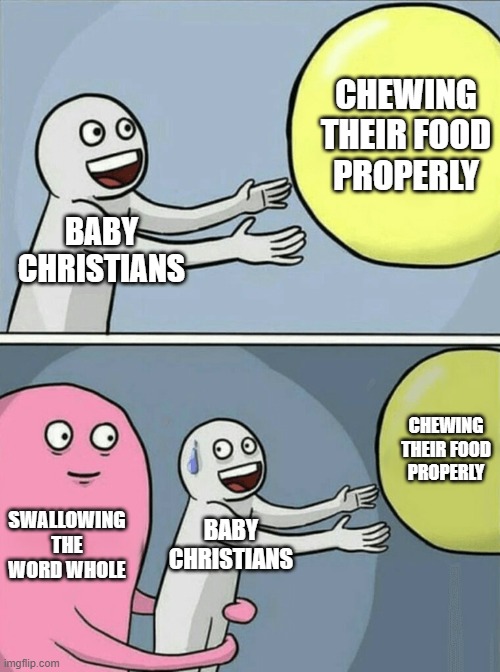
Hello and welcome, my fellow Gods, to another discussion on the celestial principles. In today’s discussion, we look at the third principle—the principle of deep and lasting impressions.
So, what does this mean? Truth be told, there isn’t anything complex about this topic. Deep and lasting impressions means just that—things, words, actions, thoughts that leave a deep and lasting impression. Think about trauma for example, the scar that trauma leaves are a negatively deep and lasting impression. Think about euphoria, that too leaves a positive (and sometimes, possibly negative) deep and lasting impression.
Usually, only experiences or events that deeply effect our emotions are what often leave deep and lasting impressions. So, then how do you the same with the word of God? How do you take something like logos and imprint it onto your heart to effect a deep and lasting impression?
How It Works
Let’s take a real-world example on this one: when a child eats solid food quickly and forgets to chew, what becomes the consequence of such actions? He slows down the rate of digestion because he’s giving his enzymes more responsibility to further break down that solid food into even smaller pieces. That’s why chewing is necessary, because you increase the surface area of the food thereby making your enzymes digest food more efficiently.
Same thing with the word. When you read the scriptures, you’re feeding your spirit and as long as you don’t meditate on what you’ve read, your spirit won’t retain all the “nutrients” you could get from what you have read. In case you think I’m making this up, let’s take a quick look at scripture,

“And I went unto the angel, and said unto him, Give me the little book. And he said unto me, Take it, and eat it up; and it shall make thy belly bitter, but it shall be in thy mouth sweet as honey.
And I took the little book out of the angel’s hand, and ate it up; and it was in my mouth sweet as honey: and as soon as I had eaten it, my belly was bitter.”—Revelations 10:9-10
What does this portion of scripture teach us? That John didn’t chew. Of course, I’m kidding.

But it teaches that the scriptures liken the word of God to food that is consumed—it has a taste, and it has an effect once ingested.
So, what does this mean for us? When we read the scriptures, we are feeding our spirit. But just because we are feeding our spirit doesn’t mean it is actually building us up. Why is that? Why is it that when I read the Bible, it does not have the same effect it talks about? Let’s answer this from both the physical world and the spiritual realm. First the physical,
When you swallow food of any kind, what happens in the process of digestion? The enzymes in your mouth, throat, stomach, and intestines make sure to break down as many nutrients from that food as possible, right? Which means depending on what you eat and how you eat it, you could prevent or allow your enzymes to maximize or minimize how much nutrients to extract from it.
More specifically, when you chew your food properly, your enzymes extract way more nutrients from the food because you break down food well enough for your itty-bitty enzymes to work with. And we all know that the more nutrients your body gets, the bigger, more awesome, and more Ven-like you become, right? It’s the exact same thing spiritually: when you consume the word by hearing the word, how much of that logos your spirit extracts nutrients from depends on how much of it you chew.
With that said, we can answer the question from the spiritual aspect,

When you read the word, it comes to you packaged with everything you need and can get from it. What does this mean? When you read the below scripture, for example,
“Ye are of God, little children, and have overcome them: because greater is he that is in you, than he that is in the world.”—1 Joh 4:4
What’s the first impression it gives you? That the one who lives inside of you is greater than the one who is in the world and because of that you have nothing to fear, right? Now that’s an amazing revelation, right there and I’d be proud of anyone for reading this and coming up with this revelation as a result.
Let’s fine-tune it, though. This same verse also implies that God lives inside of us, right? If so, then other than having overcome the world as a result, what else can this mean to us? That God lives inside of us, which on its own is a huge revelation because that means we have the creator of heaven and earth living inside of us. And if this is the case then what else could this mean? That we are God’s throne, right? And based on everything we’ve ever learned about God, we know that God’s throne is in His kingdom in heaven, which means that since we have God living in us and we are His throne, it means we have heaven inside of us. A higher revelation than the first one, right? All as a result of chewing the word into finer bits.
Let’s fine-tune this even more though, just cause. This scripture starts out by saying,
“Ye are of God, little Children…”
Which immediately suggests that John isn’t talking to all Christians, he’s talking to the little children. If that’s the case, then that means there are higher levels of maturity for Christians which subsequently means that there must be higher revelations and teaching for more mature Christians. This immediately directs you to wanting to know more about what teachings and revelations these are by exploring what the scriptures classifies as the levels of Christian maturity. This is how you digest the word!

How Do I Digest the Word?
Now that we’ve gotten a brief introduction of this principle, the question is how does it work? Let’s take a look at the answer from scripture,
“This book of the law shall not depart out of thy mouth; but thou shalt meditate therein day and night…”—Joshua 1:8
This portion of scripture tells us how to digest the word. God, Himself, tells us that you are supposed to meditate on the scriptures, day, and night. This means you read the word of God and deliberately give yourself time to read it over and over think, and thereafter think about it over and over again. Notice He tells us to meditate on it meaning that this is a deliberate effort we make consciously and not something we hope to happen in the back of our minds. We are supposed to meditate on the word over and over until it becomes a part of our mindset.
For instance, in our previous scripture where the word tells us that greater is he that is in us than he that is in the word, our response to this is knowledge is to meditate on it so much that it becomes our mindset—it becomes our Phronesis—until we are so conscious and so aware of this that we cannot think otherwise; such that no matter who asks and what comes up against us, our subconscious response is that greater is he that is in us than he that is in the word. This is the principle of deep and lasting impressions—repetition, pondering over something over something until it sinks in deep within your mindset.
What’s the Effect of Digesting the Word?

Following this understanding of the principle of deep and lasting impression, the obvious question becomes what’s the point of doing this?
“This book of the law shall not depart out of thy mouth; but thou shalt meditate therein day and night, that thou mayest observe to do according to all that is written therein: for then thou shalt make thy way prosperous, and then thou shalt have good success.”—Joshua 1:8
Reading it from the King James version might sometimes be a little hard to follow and understand so let’s read it from another translation,
“This Book of the Law shall not depart from your mouth, but you shall read [and meditate on] it day and night, so that you may be careful to do [everything] in accordance with all that is written in it; for then you will make your way prosperous, and then you will be [d]successful.”—Joshua 1:8 [Amplified]
Here, it’s a little bit clearer because then we understand that the consequence if meditating on God’s word is so that we should know exactly how to act the way we are supposed to act in any and every situation. And the natural consequence of this is that we will make our way successful. A more practical example is Jesus, how did he always know what to do, when to do it, and how to do it?
On one account, Jesus was walking, and a blind man kept crying out to him until his disciples were embarrassed and asked if they could send him away. Jesus decided to stop and heal the man and observe how he does so,
“And Jesus said to him, ‘Recover your sight; your faith has made you well.’”—Luke 18:42
This is all he needed to do to heal this man. Keeping this in mind, let’s take a look at another account,
Jesus was walking and saw a man who had been blind from birth. Historians suggest that this man was actually born without eyes meaning he only had holes and no eyeballs. And his disciples asked who sinned for that man to have been born that way and Jesus responded saying no one had to have sinned. But, observe how he heals this one in comparison to the previous one,
“When he had thus spoken, he spat on the ground, and made clay of the spittle, and he anointed the eyes of the blind man with the clay,
And said unto him, Go, wash in the pool of Siloam, (which is by interpretation, Sent.) He went his way therefore, and washed, and came seeing.”—John 9:6-7
In this account, Jesus actually formed the man’s eyeballs by spitting on the ground, forming clay of the spit and placing that clay on the man’s eye sockets. Once he did that, he speaks to the man to go wash in the pool and the man is healed. How did Jesus know what to do? These weren’t the words and actions of a man who was just doing random things, he knew exactly what to do and when to do it and how.
This is what God means in the book of Joshua when He says,
“…you shall read [and meditate on] it day and night… so that you may be careful to do [everything] in accordance with all that is written in it; for then you will make your way prosperous, and then you will be [d]successful.”—Joshua 1:8 [Amplified]
The kind of consciousness Jesus had throughout his ministry isn’t one that just comes onto you by accident or by impartation of anything, it’s a mindset that you create by subjecting yourself to the word and learning what to do, how to do it, and when to do it. There are laws and principles in the kingdom of God and until you know these laws and principles, you cannot live the full and true Christian life.

Paul himself says so,
“Now what I mean [when I talk about children and their guardians] is this: as long as the heir is a child, he does not differ at all from a slave even though he is the [future owner and] master of all [the estate]”—Galatians 4:1 [Amplified]
He is saying that for as long as you decide to stay a child by being ignorant of more mature revelations and refusing to be taught by your guardians (meaning the ones appointed as your leaders in the body of Christ), then you will continue to be a child and will live the same type of life as a slave and be no different from one even though God has said he has given you all things.
“Therefore let no man glory in men. For all things are your’s;
Whether Paul, or Apollos, or Cephas, or the world, or life, or death, or things present, or things to come; all are your’s;”—1 Corinthians 3:21-22
Paul tells us that God has given us all things. He is saying God has made us masters and lords over reality. But how can we live as masters and lords when we do not know how to get all things that have been given to us?
All this comes by this principle—the principle of deep and lasting impressions because this the thing that gives you Phronesis.

CONCLUSION
If I am to conclude this article then let it be on this note: these principles and everything we discuss on my platform is for Christians and Christians alone. If you are not Christian then this cannot apply to you no matter what you try. And this is not me saying this, Jesus Himself says it,
“Jesus saith unto him, I am the way, the truth, and the life: no man cometh unto the Father, but by me.”—John 14:6
There is no other way to have this except by becoming Christians. Christianity is not just a religion. Read everything we’ve taken a look at from our very first article series on Who and What a Christian Really is for yourself to know what a Christian is. If you are here and haven’t given your life to God (and therefore aren’t Christian) then I offer you the opportunity to give your life to God.
Simply believing in God and in Jesus DOES NOT make you Christian.
“That if thou shalt confess with thy mouth the Lord Jesus, and shalt believe in thine heart that God hath raised him from the dead, thou shalt be saved.“—Romans 10:9
Paul tells us exactly how to become Christian. He says you need to believe that God raised Jesus from the dead, and you need to confess with your mouth that Jesus Christ is Lord. If you have never done this then you have not Christian no matter how often you go to church and no matter how good a person you are. So, right now, if you’re reading this and wish to give your life to God and become a Christian, repeat this prayer below out-loud to yourself wherever you are,
“O Lord, God,
I believe with all my heart in Jesus Christ, Son of the living God.
I believe He died for me and God raised Him from the dead.
I believe that He’s alive today.
I confess with my mouth that Jesus Christ is the Lord of my life from this day.
Through Him and in His Name, I have eternal life; I am born again.
Thank you, Lord, for saving my soul!
I’m now a child of God. Hallelujah!”
Now if you said that prayer for the very first time and gave you life to the Lord today, congratulations: you are now a new creation! You are born again! And you are child of God from this day. Please, please, please reach out to me directly using my contact form or on the numbers given below and I will respond to you immediately: I have amazing gifts lined up just for you and I wish to help you through your Christian walk. Feel free to read my article series on Who and What A Christian Really is to learn more about who you are as a Child of God, what it means to be a child of God, and what you have as a child of God.
Thank you so much for joining me on this amazing journey and I look forward to seeing you in my next article where we discuss the Mirror Principle.
Leave a Reply

Cape Town
Inside My World

Inside My World
Selected by Venancio




0 Comments